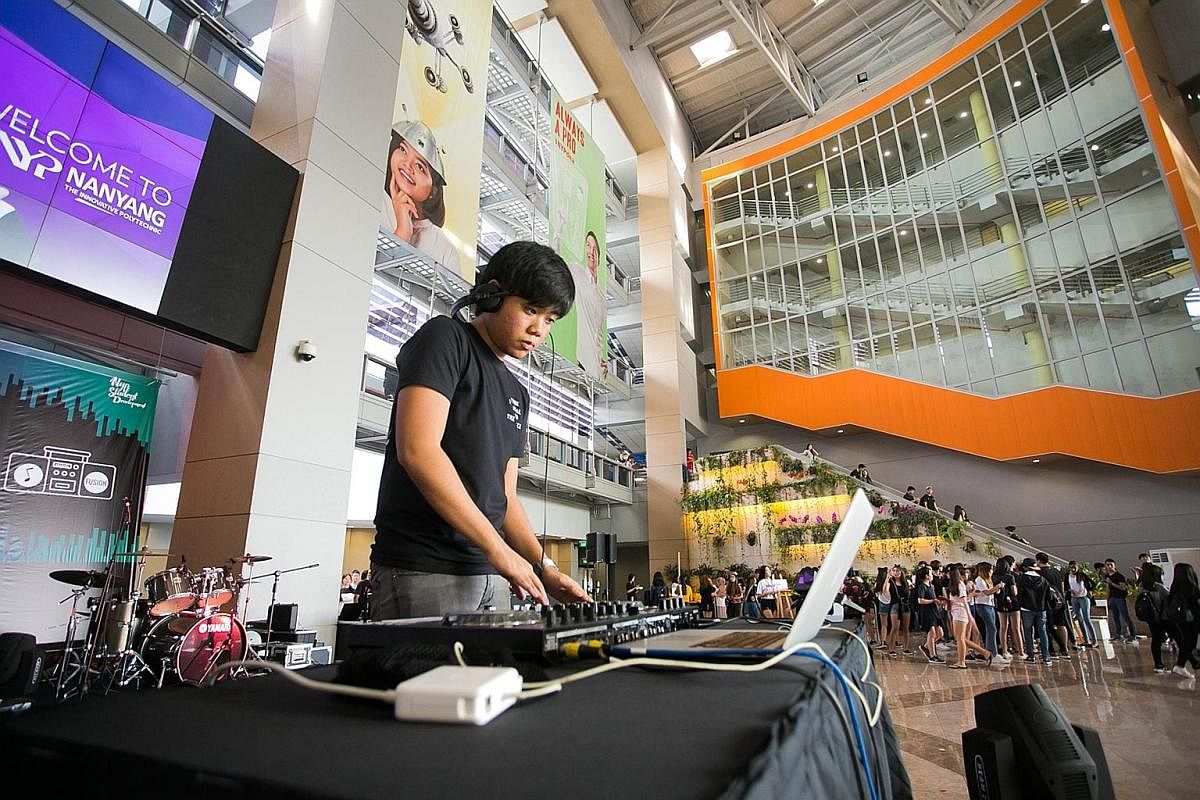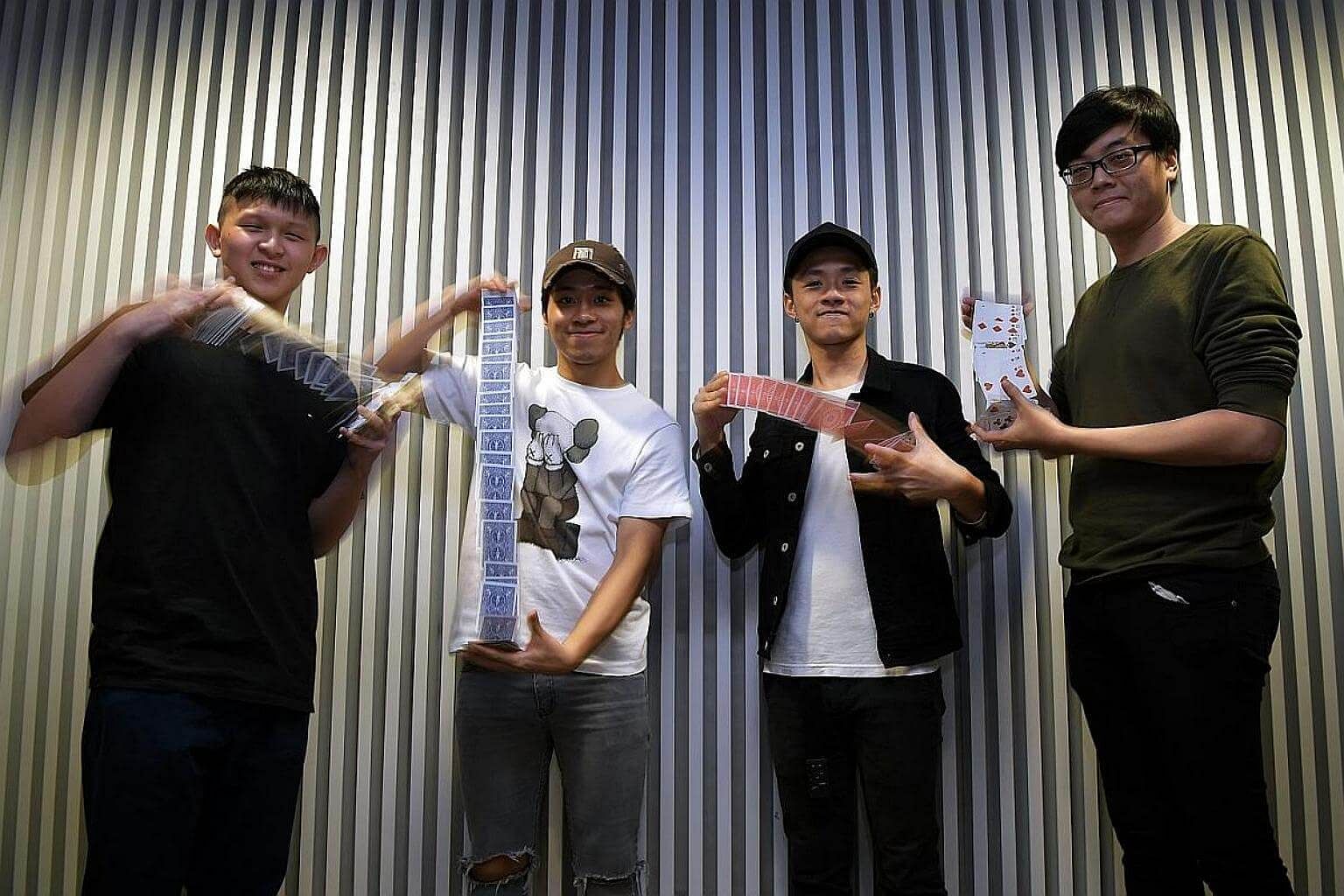From DJ-ing to beer-brewing, a new spin on CCA
Forget soccer clubs. Co-curricular activities at tertiary institutions these days offer anything from DJ-ing to beer-brewing

Lessons are over and it is time for co-curricular activities (CCAs). But instead of soccer balls or band instruments, Republic Polytechnic student Tay Eng Sin, 19, needs only a deck of playing cards.
At his club meetings, members practise tricks, switch cards and work on their sleight of hand.
No surprise, since his CCA is a magic interest group.
CCAs at tertiary institutions are getting more varied, reflecting the diverse interests of students.
A check with polytechnics and universities here reveals a wide variety of CCAs, many initiated by students, ranging from clubs that practise DJ-ing to cocktail mixology groups.
At Nanyang Polytechnic, for example, there is a group called Live Audio, where members learn to deejay, mix different music genres and provide audio support for events by the polytechnic and other CCAs.
In the last two years, six new CCAs have also been started at the polytechnic, which currently has 84 CCAs.
One of them, Business Networking Club, was formed three months ago by a first-year business informatics student. The society aims to link students up with the industry of their study, as well as encourage aspiring student entrepreneurs and venture capitalists.
Ms Paua Yifei, 43, the polytechnic's deputy manager for leadership and communications, says compared with a decade ago, there is a greater variety of interest groups on campus. "This could be due to greater awareness and exposure of youth to different interests and passions."
The diversity can be seen across most tertiary institutions. For example, the Singapore Management University (SMU) has SMU Barworks, a club comprising cocktail-making and bartending enthusiasts.

Over at National University of Singapore (NUS), there is Makeup.And. Design, a group for students interested in make-up and apparel design.
NUS has more than 200 student organisations, offering an array of CCAs in areas such as culture, music, research and sports. These include a group dedicated to helping the university's special-needs students.
At Singapore University of Technology and Design (SUTD), there is a CCA called SUTD Organisation of Autonomous Robotics, or Soar, that focuses on creating and building robotic solutions. It became an official CCA in March this year and has built and exhibited a waiterbot - an autonomous robot that can deliver food to guests - at several events, among other achievements.
One of the members, first-year student Glenn Chia, 21, used to be a canoeist in junior college.
He says: "Canoeing involved reading up on nutrition and watching videos on techniques. But in Soar, it is different. There is a lot of independent learning.
"So far, it has been a good experience and I have learnt a lot about soldering and basic electronics, which I think are good skills to pick up."
The guidelines on what constitutes a valid CCA vary among schools, but in general, the students who want to set up a group have to show how their objective is meaningful and how the group can be sustainable.
At Republic Polytechnic, a new CCA must have at least 15 full-time students as members and two full-time staff as advisers, says Mr Ganesh Kalyanam, director of the office of student and graduate affairs.
It must also be open to all students and have the potential to contribute to meaningful causes, among other criteria.
Learn to brew your own beer

If you like brewing your own beer and baking your own cakes, there is a food craft and fermentation club at Nanyang Technological University (NTU) that teaches you to do just that.
Started by second-year student Tay Dao Qian and final-year student Aziel Yeo - who share an interest in fermentation - the club was approved by the university in April this year.
It aims to be a place where members can share their knowledge in crafting specific foods and beverages.
Mr Tay, 24, a business student, says: "People actually feel this club is 'cool'. After all, home-brewing is legal in Singapore and our club focuses on the science and engineering behind the brewing. We also abide strictly by all regulations."
The 70-member-strong club meets once a week and alternates between baking and brewing sessions conducted in workshop spaces, where there are ovens and refrigerators.
So far, the members have held brewing workshops using dry malt extract, as well as sessions where they learn about the history and fermentation science theory behind pale ale.
Club members have also made pandan chiffon cake and various pastries.
One of the club's members, second-year business student Karen Ong, 21, learnt about the club when she tasted some of its cookies during the university's recruitment fair for co-curricular activity groups this year.
She says: "It has been a very pleasant experience thus far. The pandan chiffon cake-baking session has been the most memorable.
"My group was whisking by hand and it was very tiring. But the process of seeing the egg whites slowly turn into meringues was very satisfying."
Another member, second-year civil engineering student Lim Bee Ting, 21, says: "My first brewing workshop was the most memorable.
"I tasted the end product in late September. It tasted like beer, but because I brewed it myself, I felt an extra sense of satisfaction."
Dog therapy to relieve exam stress

When final examinations approach at the National University of Singapore (NUS), the dogs come out.
To comfort and have fun with the students, of course, thanks to animal-assisted, stress-relief therapy sessions organised by NUS Peace, short for People Ending Animal Cruelty and Exploitation.
The animal welfare interest group organises these sessions for students, in collaboration with Therapy Dogs Singapore, a non-profit voluntary welfare group.
In April this year, it organised two sessions, where about 50 students had the chance to interact with about eight dogs a session - petting, cuddling and feeding them treats as well asplaying with them.
The group's president, Ms Vu Minh Phuong, 23, a fourth-year project and facilities management student, says: "After each two-hour session, many participants said they enjoyed playing with the dogs and that dogs were very cute.
"The experience also helped them take their minds off the stressful preparation for the examinations, at least for a moment."
NUS Peace was established in 2006 by a group of animal-loving students. There are more than 50 members.
The group has started several initiatives to improve the interests and welfare of animals - be they stray, domestic or farmed.
For example, in 2009, it proposed a "trap-neuter-release-manage" scheme to better control the cat population on campus.
The scheme has now been adopted across the campus, involving both students and staff in the active management and care of resident cats.
In 2015, members also started a regular volunteering programme at local animal shelters, where volunteers clean the shelters, prepare food for the animals as well as walk the dogs.
Students full of tricks
Every Wednesday, between 20 and 30 Republic Polytechnic students gather in a lecture theatre with their cards, coins and bags of confetti.
Before you can say "presto" or "abracadabra", they are showing one another tricks, sharing skills, clapping when someone pulls off an amazing trick and being patient and supportive when someone fumbles.
Called Magic Interest Group, this co-curricular activity (CCA) group was formed in 2003 and now has more than 30 members.
Dr Loke Han Ying, 47, a senior lecturer at the polytechnic's centre for educational development, has been the CCA's staff adviser since its formation.
He says: "Most students joined this CCA out of curiosity, but then their interest in magic grows when they see like-minded people.
"With the fame and popularity of magicians such as Taiwanese Lu Chen and American Criss Angel, more people are becoming interested in magic as a performing art."

Students do not need any experience in magic to join.
He adds: "Some people think magic is just for kids or that there are only set tricks to perform. But the reality is that magic is very good at unleashing a student's creativity.
"It also helps students overcome stage fright and boosts their confidence."
When the students' schedules permit, the group also takes part in performances and competitions.
The group's president, second-year game design student Farell Yeo, 18, says: "In secondary school, a senior once showed me and some friends a card trick - making the face of the card change before our eyes.
"I was truly amazed. And I thought that if he could amaze me, I could do the same to others.
"That's how I became interested in magic and, when I realised there was a CCA available for it, I did not hesitate to join."
Join ST's Telegram channel and get the latest breaking news delivered to you.
A version of this article appeared in the print edition of The Sunday Times on November 19, 2017, with the headline From DJ-ing to beer-brewing, a new spin on CCA. Subscribe

